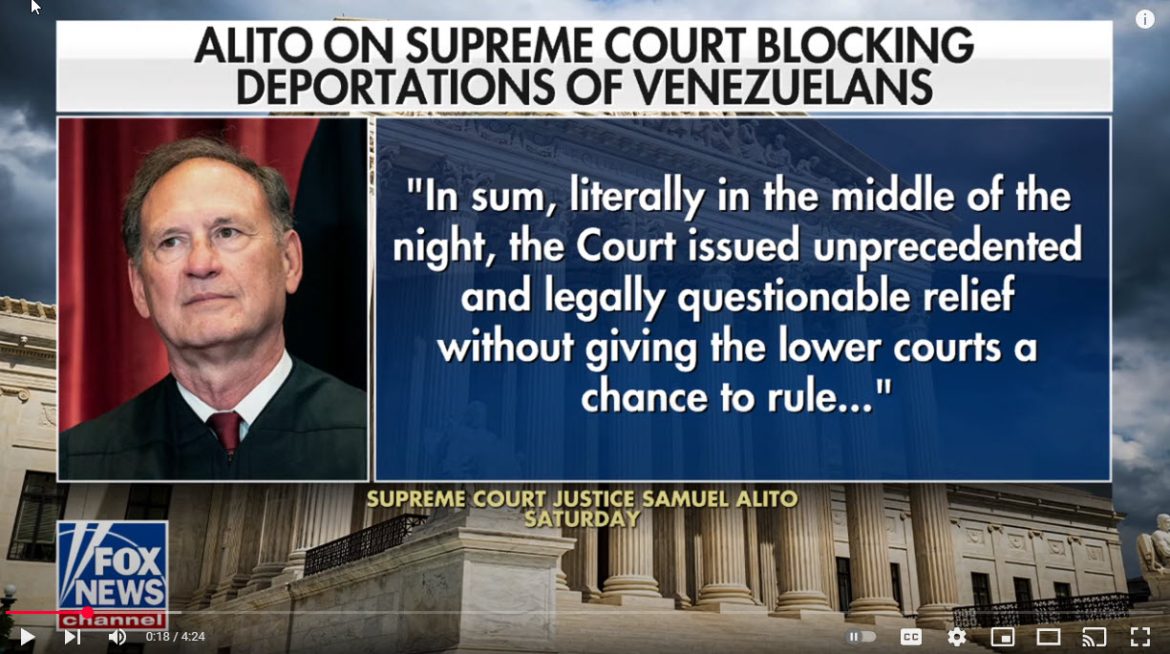Supreme Court Justice Samuel Alito issues a rare and strongly worded dissent after the high court temporarily blocks deportation flights to El Salvador under the Alien Enemies Act, criticizing the majority for what he calls an “unprecedented” and “legally questionable” move that bypasses normal judicial process.
The unsigned emergency order, issued without full briefing or oral arguments, temporarily halts deportation of migrants from the Northern District of Texas to a high-security prison facility in El Salvador. Justice Alito, voicing his opposition, says the Court’s action is procedurally flawed, as it was made without input from the Biden administration, without allowing lower courts to weigh in, and without explanation for the intervention.
“This Court has issued unprecedented relief,” Alito writes, adding that the majority acted hastily and without any justification for immediate action. He further argues that no compelling reason was presented to justify the Supreme Court stepping in at this stage, calling the decision “entirely inappropriate.”
The ruling applies only to migrants detained in the Northern District of Texas and does not currently extend to other jurisdictions. However, related cases involving similar deportation flights are pending in federal courts in New York, Colorado, and the Southern District of Texas, where temporary injunctions are also in place.
At the heart of the legal battle is the application of the Alien Enemies Act, an 18th-century law that gives the executive branch broad powers to detain and deport non-citizens from countries the U.S. considers hostile. The Trump administration revived the law during its second term, designating certain regions of Central America as high-risk zones for terrorism and gang-related threats, including parts of El Salvador.
Migrants targeted for deportation under this authority are being transferred to a facility in El Salvador that has faced international scrutiny for harsh conditions and alleged human rights abuses. Civil rights organizations argue that sending asylum seekers to that prison violates international law and subjects them to likely torture or extrajudicial punishment.
The Biden administration has been caught in a political crossfire. While publicly criticizing the prison conditions and distancing itself from the Trump-era designation of El Salvador as a “hostile zone,” the White House has not yet formally rescinded the underlying legal framework. Advocacy groups say this passive stance has allowed deportations to continue under the controversial order.
The Supreme Court’s emergency intervention halts those deportation flights, at least temporarily, in response to lawsuits filed by legal aid organizations representing Central American migrants. They argue that the expedited deportations deprive migrants of due process and risk returning individuals to situations where their lives are in danger.
Justice Alito’s dissent signals growing tensions within the Court over the increasing use of emergency orders, often referred to as the “shadow docket.” Critics say the Court is making consequential decisions without transparency, hearings, or public scrutiny.
Meanwhile, immigration attorneys and humanitarian groups welcome the Court’s temporary stay, calling it a life-saving move. “The Supreme Court just gave these migrants a chance to be heard before they’re thrown into a prison system known for its brutality,” says Maria Torres, a lawyer with the Immigrant Defense Coalition.
It remains unclear how long the stay will last or whether the Court will agree to hear the full case in its next term. For now, the decision effectively halts all deportation flights from Texas to El Salvador under the Alien Enemies Act, while pressure builds on the Biden administration to review the policy.
The ruling marks a significant intersection of immigration policy, executive power, and judicial oversight, as the fate of hundreds of migrants now hangs in legal limbo while broader questions about due process, foreign policy, and civil liberties remain unresolved.



